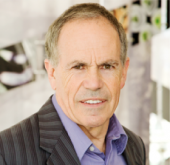Stephen P. Long, FRS
| |Academic Appointments
Ikenberry Endowed University Chair of Crop Sciences and Plant Biology
University of Illinois at Urbana-Champaign
2018 – present
Professor Fellow of the Royal Society (FRS)
Department of Crop Sciences, Lancaster University, UK
2016 – present
Center for Advanced Studies Professor
University of Illinois at Urbana-Champaign
2013 – present
Faculty
Carl R. Woese Institute for Genomic Biology, University of Illinois at Urbana-Champaign
2004 – present
Faculty Fellow
National Center for Supercomputing Applications, University of Illinois at Urbana-Champaign
2001 – present
Contact
Office: 1408 IGB
Phone: 217-244-0881
Email: slong@illinois.edu
Research Interests
- To understand mechanisms of plant responses to both rising atmospheric carbon dioxide concentration and tropospheric ozone, with particular reference to photosynthesis and relating changes at the molecular and biochemical level to observations of whole systems in the field.
- Establish the potential of mitigation of atmospheric change through the development of herbaceous energy crops.
- Advance the development of accessible mechanistic mathematical models relating environmental effects on photosynthesis to plant productivity (see WIMOVAC).
- To understand the limitations to C4 photosynthesis and the adaptation of the process to cooler climates.
Research Programs
- Director, Realizing Increased Photosynthetic Efficiency (RIPE)
- Director, TERRA Mobile Energy-Crop Phenotyping Platform (TERRA MEPP)
- Co-Director, Water Efficient Sorghum Technologies (WEST)
- Co-Principal Investigator, Crops in silico (Cis)
- Co-Principal Investigator, A Modeling Framework to Couple Food, Energy, and Water
- Chief Editor, Global Change Biology, GCB Bioenergy, and in silico Plants
About Steve
Steve Long has served as Principal Investigator and Director of RIPE since its inception in 2012. He is the Ikenberry Endowed Chair of Plant Biology and Crop Sciences at the University of Illinois. Steve's research has increased our understanding of how global climate change is affecting plants and how photosynthetic efficiency in crops may be improved to affect sustainable yield increases. His expertise ranges from plant molecular biology and mathematical modeling to in silico crop design and field analyses of the impacts of atmospheric change and transgenic modifications of photosynthesis on crop performance. Steve is also the director of Renewable Oil Generated with Ultra-productive Energycane (ROGUE) He served as Deputy Director of the UC Berkeley-U Illinois-BP Energy Biosciences Institute (EBI) until 2012. He is Founding and Chief Editor of Global Change Biology, of GCB Bioenergy and of in silico Plants.
Steve was elected a Fellow of the Royal Society of London in 2013 and as a Member of the National Academy of Science of the United States of America in 2019. He was elected a Pioneer Member of the American Society of Plant Biologists in 2023. Steve has been recognized by Thomson Reuters/Clarivate as a highly cited researcher in Plant and Animal Sciences in every year from 2005 to 2021. His work has been published in more than 400 peer-reviewed journals, including Nature and Science. He has been recognized with many awards, including the Marsh Award for Climate Change Research from the British Ecological Society, the Kettering Award from the American Society of Plant Biologists, the Innovation Award from the International Society for Photosynthesis Research and the Graduate Student Mentoring Award of the University of Illinois. He served as the Newton-Abraham Visiting Professor at Oxford University, UK, where he retains a Visiting Professorship. He has given briefings on food security and bioenergy to President George W. Bush at the White House, to the Vatican, and to Bill Gates. He earned his bachelor’s in agriculture from Reading University and his doctorate in plant sciences from Leeds University.
Learn more
Watch this video from the University of Illinois Campus Insights where Steve Long talks about his lifelong interest in plants and recent work to boost crop yield by improving photosynthetic efficiency.
Check out Steve Long's Center for Advanced Study (CAS) lecture on feeding and fueling the world by 2050.
- Listen to Steve Long on The Naked Scientists and find out: Could increasing the production of sugarcane ethanol help to cut global carbon emissions?
- Hear how Steve and his team are altering the process of photosynthesis SciTech Now.
- Read more on Steve’s Wikipedia page or University of Illinois experts page.
Publications
Refer to Steve's Google Scholar page for a complete list of his publications.
